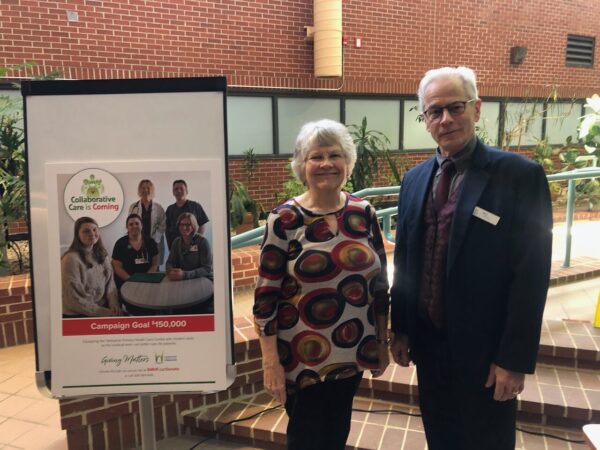
The pandemic has shown a light on issues with how we care for each other on an institutional level, forcing us to ask questions like is the care we provide to vulnerable people adequate, and up to our community standards?
A Mount A researcher and her partners in the New Brunswick Coalition of Pay Equity are now looking into the flip side of that question, focussing on the working conditions of the 10,000 to 12,000 care sector workers in New Brunswick.
Dr. Rachelle Pascoe-Deslauriers is launching her research project this Wednesday in a webinar featuring a panel discussion and keynote address talking about how people value care work here and internationally. People can register for the talks here.
Pascoe-Deslauriers and New Brunswick Coalition for Pay Equity director Johanne Perron spoke with Tantramar Report to explain their project and the state of care work in New Brunswick:
“In the pandemic, we’ve been hearing and talking quite a lot about issues that impact care and the quality of care that people receive, the availability of care,” says Pascoe-Deslauriers. “But I think what is not getting as much attention is some of those root causes.” Workforce concerns such as worker shortages and low wages and linked directly to what care people receive, says Pascoe-Deslauriers. “Quality of employment and quality of care I see as going hand in hand,” she says.
Pascoe-Deslauriers’s project will happen in two phases, first a research phase collecting and documenting comparable care systems around the world, and then working with a steering committee to determine best practices applicable in New Brunswick.
Johanne Perron says the care sector includes home support workers, transition house workers, special care home workers, community residence workers, and people who take care of people with disabilities or mental illnesses. Care sector workers provide “a wide variety of services that are really important for the most vulnerable members of our society,” says Perron.
About 90% of them are women, she says, and the wages currently range from $14 per hour to $16.80 an hour. “We did a pay equity study that showed that fair pay would be between $20 and $26 an hour, depending on the services,” says Perron. “So there’s a big discrepancy between the value of this work and the pay.”
“Even though during the pandemic, we talked about it a lot and we did improve the wages, we’re still far from fair pay for the sector,” says Perron. And its not just pay that is problematic, but other working conditions, like lack of access to paid sick leave. “During COVID, that was a major issue,” says Perron. “Workers were saying they were worried about the people they cared for, but at the same time, were asked to leave work, even if they had a sore throat, without pay and wait for 10 days at the beginning of the pandemic.” Isolation requirements have since been shortened, but the fact remains, many care workers must lose income if exposed to the virus or if they develop symptoms.
Pascoe-Deslauriers says the care sector is “a fragmented sector and institutionally complex,” which can make improvements to both pay and working conditions hard to come by. “It’s made up of a large number of agencies who do this work, and the vast majority of these organizations are very small. They would be what we would call small to medium sized enterprises.” The sector is also a combination of for-profit and not-for-profit structures, but very much relying on public investments. “So this means that you have a patchwork of services that are engaging with our vulnerable population and aging population,” she says. “And in many ways a vulnerable workforce because of the working conditions.”
“This is where the debates about what’s happening in other countries really comes into effect,” says Pascoe-Deslauriers. “There is research and increasing public policy debate in some other countries, about the relationship of the state as both the one regulating employment, funding it, as well as regulating the quality of the care that people receive. So they exist in this multi-faceted relationship with what happens in the care sector.”
Elsewhere the policy debate includes options like adding living wage policies to contracts, or including fair working conditions as part of government procurement practice. “We don’t really have that debate happening here at the moment,” says Pascoe-Deslauriers, but her research will be asking the questions. “These are spaces that we can turn to other countries and say, well, what are they doing to address the role of the state as the funder, the one shaping employment, and the one managing and regulating the service that’s being requested?”
Valuing Work in Community and Social Care in New Brunswick is being launched Wednesday, January 26, from 11am to 1pm. People can register for the online event here.
Professor Patricia Findlay of the Scottish Fair Work Convention will deliver the keynote speech, and Pascoe-Deslauriers will host a panel discussion featuring:
- Laurie Anderson, Human Service Counsellor in a community residence and President of the New Brunswick Community Service Unions;
- Tina Learmonth, President of the New Brunswick Home Support Association;
- Johanne Perron, Executive Director of the New Brunswick Coalition for Pay Equity.














